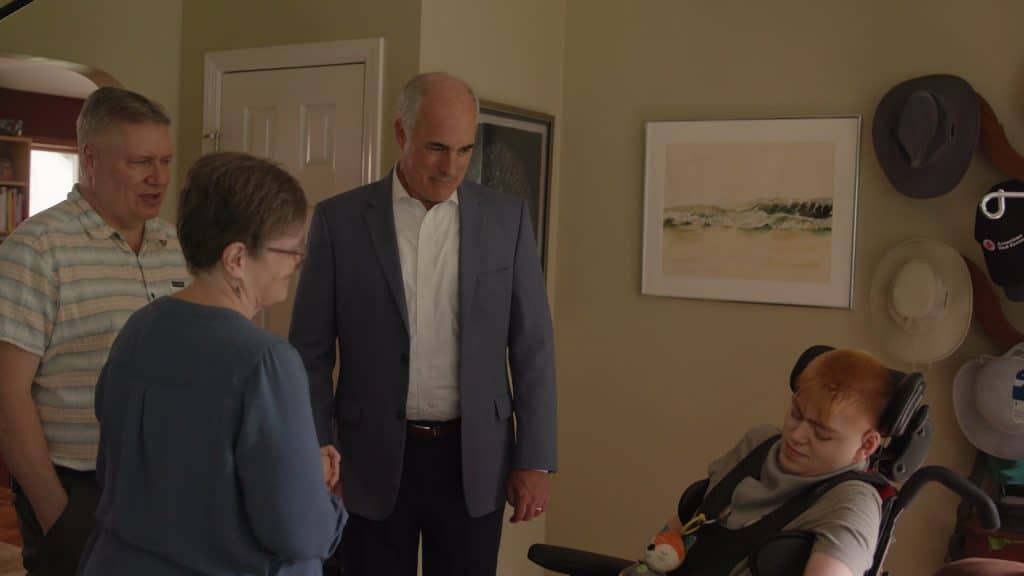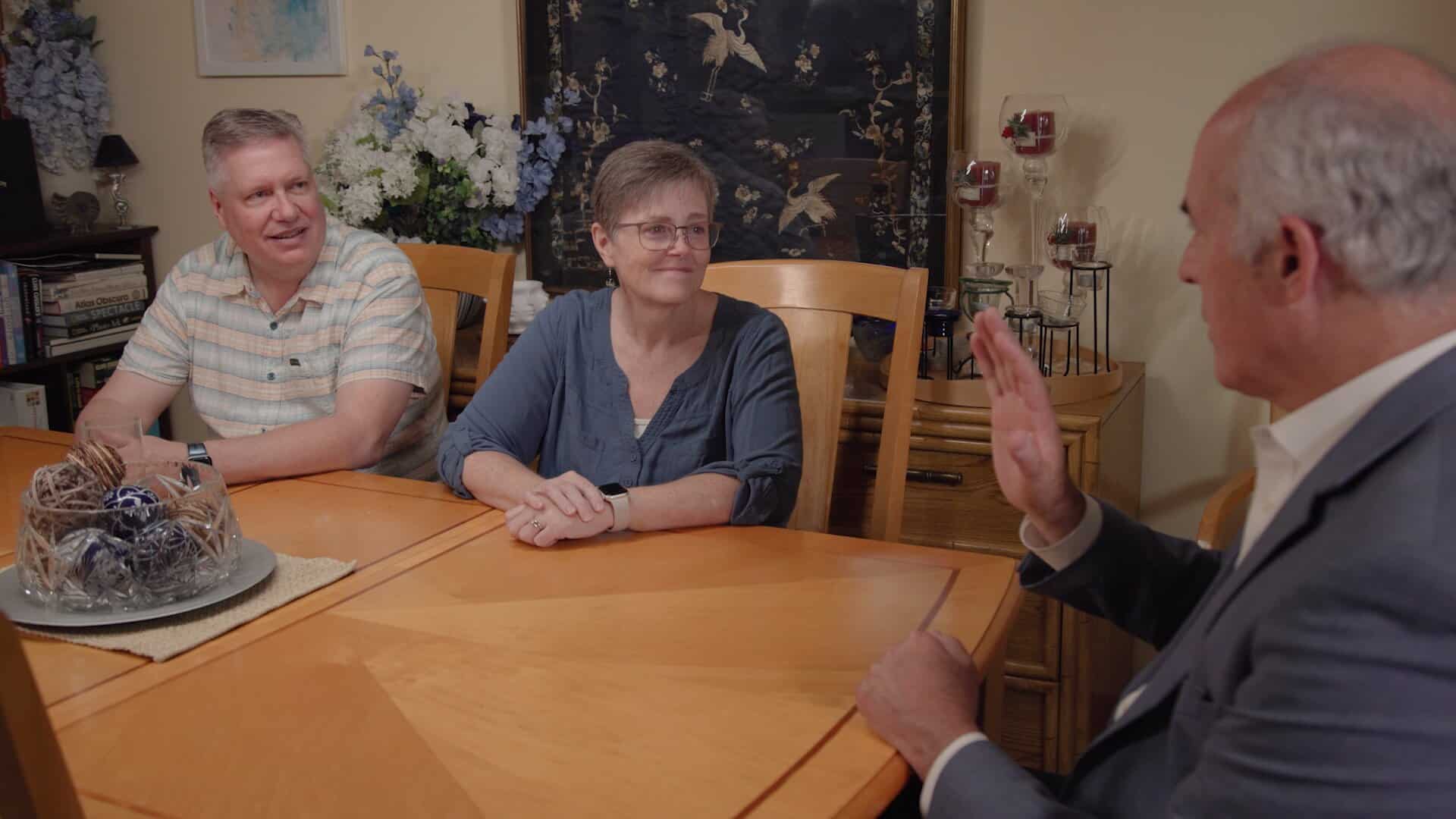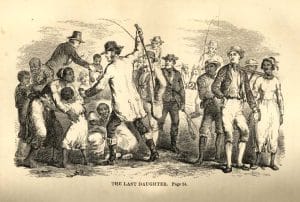Chris and Maggie Dunham, who live in Feasterville, first met on a rafting trip down the Delaware River. “I wouldn’t call it a blind date,” said Chris. “We knew about it. I wouldn’t quite call it a date either. There were like 45 people.”
A year later, Chris and Maggie got married, and in 2008 they had their son, Will.
When Will was one month old, both Maggie and Chris noticed Will’s vision wasn’t developing at the same rate as other kids, so they took him to a vision specialist. As Will aged, he began missing more milestones, which led him to be placed in a section called undiagnosed children. It wasn’t until Will was five that he was diagnosed with FOXG1 syndrome, which according to Maggie only about 1,200 kids have worldwide.
“FOXG1 leads to a lot of developmental delays,” said Maggie. “Will still hasn’t found his voice yet. He doesn’t walk. He’s fed with a feeding tube. He also has a seizure disorder, and we have been very fortunate that he has been seizure-free for a couple of years with him on medication.”
Due to his condition, Will needs around-the-clock attention. Chris quit his job as a librarian to be Will’s primary caregiver, and the family does get weekly support from other aids, but just getting help has been a major challenge for the Dunham’s. “They don’t have enough aid support in these companies. And so we have the ability to and the approval to have aids five days a week for assistance with custodial care. But we currently only have three days, and two days are left,” said Maggie.
The lack of help has caused both physical and mental stress for Maggie and Chris. Chris has had two herniated discs, which doctors believe happened from Chris lifting Will as he got bigger. Chris and Maggie have also only spent five nights away since Will was born due to the lack of overnight help. Senator Bob Casey, who has been pushing for legislation such as the Long-Term Care Workforce Support Act and Home and Community Based Services Access Act, which will help provide more money to aids and also provide money and resources to family members taking care of disabled children and older parents, met with the Dunham’s to hear about Will’s day-to-day life, understand what challenges Chris and Maggie go through to find help, and explain what bills in the senate are currently at work to provide help to families.

Pennsylvania Senator Bob Casey meet with Chris and Maggie Dunham and their son Will. Image contributed.
“It’s another reminder that we have a lot of families that are struggling every day with caregiving responsibilities, the weight of which and the complexity of which I can’t even begin to imagine,” said Casey after meeting with the family. “These are people that lead lives of struggle, and they’re caring for a loved one out of a sense of obligation and a love for that individual, but they are often fairly alone in that work and in that struggle. So, what I’ve got to do and what members of Congress ought to do is vote for a policy that will lift that burden a bit and provide a measure of relief that is not available today.”
When talking to the Dunham’s, Casey explained some of the legislation being worked on at the federal level, which included more help for family caregivers and more commitment to home and community-based services. “That funding would have to be an increase in Medicaid dollars, which would give us an opportunity to focus on the caregiver and on getting their wages up,” said Casey. “And giving them the professional status that we claim to accord them in society.”
“But we have to also do something to help the families. Families like yours that are struggling with managing all those different demands and scheduling your time. I just can’t imagine enduring what you’ve had to endure just to get through every day every week,” Casey said.
READ: Senator Bob Casey Tells Bucks County Voters ‘This Race Is About Rights and Fights’
Both Chris and Maggie found the conversion with Senator Casey very informative. “I think that there is actual policy being looked at in Washington and that has been proposed. I was not aware that those home and family programs were even being discussed,” said Maggie.
“Not knowing the specifics of the programs involved, but that they are out there and he’s championing them, and we’re hopeful,” added Chris.
The struggles to secure funding are not just at the national level. At the local level, the Dunham’s have had major difficulties finding programs that will help support Will. Recently, Chris was able to get a stipend through the consolidated waiver services, but receiving the funding was a struggle. The program has existed for three years, but both Maggie and Chris only learned about it nine months ago. Usually, this money is only dispensed to disabled individuals who are over 21 and live in a home or group home.
“Three years ago, they created a small section of qualification for consolidated waiver for medically complex children. So, under the age of 18, kids that were diagnosed as medically complex with an intellectual disability can tap into the consolidated waiver services earlier,” said Maggie. “And one of the services that is provided under this waiver is called a life share program. The Life Share program is what we have created here. We have created a Life Share home, and the caregiver of that disabled individual will get a stipend for caring for that individual. So now Chris is getting a stipend from this waiver program that’s paying him to care for our son.”
While this program will be very helpful, it was very hard to find. “It was not advertised. I happened to find out about it through a supervisor through a supervisor through a supervisor because I’ve been asking for waiver service money for years.”
While there is a lot of work to be done at the state and local levels in terms of funding and marketing, Senator Casey is working on legislation to help everyone in this process. “The best bill is the one I’m leading, the Better Care Better Jobs Act, which focuses on both the care for the individual who needs it, as well as the job for those providing the care, the caregivers. We’ve got today in the country a caregiving crisis. There is no other way to describe it,” said Casey.
“We have to address it both at the care level, what happens to that individual. Do they have access to services and treatments and therapies, not just available to them but preferably available in the home or in the community? And then secondly we have to focus on the worker, the caregiver. We have to lift their wages. We’ve got to make sure they have benefits. They should have the opportunity to join a union, where they can have economic security.”
READ: Pennsylvania Jewish Dems Accuse GOP Senate Nominee of Profiting from ‘Antisemitic’ Online Platform
The Better Care Better Jobs Act was created by Casey U.S. House Rep Debbie Dingell in January 2023, and then reintroduced in March of that year. As of right now, the Bill and similar bills do not have the votes to pass through Congress. “If there is a crisis, and I think there is, we have to meet that crisis with an answer for families,” Casey said. “Part of that is getting the federal government much more invested in this kind of care. Home care, community-based care, not simply all or most of the focus being on institutional care. And I hope Republicans will join us in this.”
“I’ve got a little advice for them,” said Casey. “They better join us over the next number of years or their constituents are going to come right through their front door, because people are demanding this and they should.”






